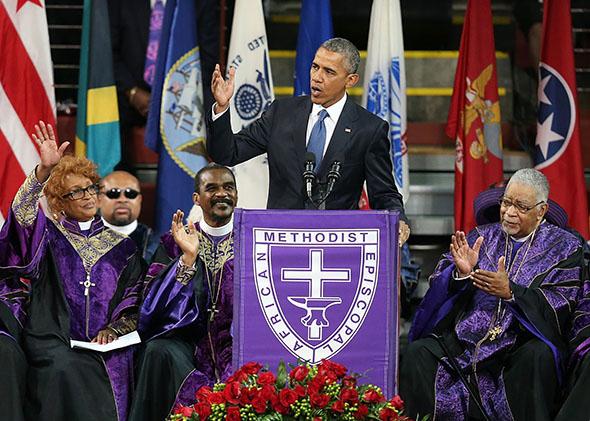A week ago, Barack Obama looked dissipated and dejected. He’d come to the White House press room to speak about the massacre in Charleston, South Carolina. The room, with its low ceiling and tight quarters, matched his mood. It’s a venue for tiny political fights relentlessly pursued in circles. The president testified to that lack of progress, showing visible frustration with his impotence in the face of gun violence and racial hatred.
A week later, the president’s mood had been transformed—he was as expansive as his new venue, the College of Charleston’s 5,000-seat arena. Out of the violence the president fashioned an argument for perseverance and found the spark for action that seemed to have been taken from him the week before.
The spark was located in the life of Clementa Pinckney, the state senator and pastor of the Mother Emanuel Church, whom the president was there to eulogize. It was also found in the grace he saw in the family members of the victims who had forgiven the shooter during his bond hearing, and in the reaction of the people of Charleston.
“This whole week I have been reflecting on this idea of grace,” the president said. He sure had. The speech wasn’t just a testimony about grace, it was a demonstration of it.
After talking about Pinckney, the president turned to the subject of grace and at that point, he stopped speaking sentences, but instead lines from the hymn “Amazing Grace.” In his rhetoric and in his preacher’s cadence, he was now praising Pinckney by channeling him. Then, for those not used to spending time in the pews, the president as professor returned. “According to the Christian tradition, grace is not earned, grace is not merited, it is not something we deserve … grace is the free and benevolent favor of God.”
Obama gave that Sunday school definition because he was preparing to make an argument. It was the preamble to the most religious speech of his presidency and one of the most overtly religious speeches from a president in a long while. How powerful was this grace, in the president’s vision? It had acted through the killer, who the president portrayed as an unwitting instrument of the Almighty: “He didn’t know he was being used by God.”
The president was no longer giving a speech about a tragedy; he was trying to leverage the grace displayed in the wake of that heinous act into a nation’s purpose. “As a nation out of this terrible tragedy, God has visited grace upon us,” he said. “He has allowed us to see where we have been blind.” It was that grace, the president argued, that helped South Carolina lawmakers conclude that the Confederate flag should come down.
But there was more power in grace than simply providing the impetus to lower a flag. “He has given us the chance where we have been lost to find our best selves,” the president said. “We may not have earned grace, but we got it all the same. He gave it to us anyway.” And that means, he continued, that America has a duty: “It is up to us now to make the most of it. To receive it with gratitude and prove ourselves worthy of this gift.”
The president then outlined the worthy fights, from lessening gun violence to tackling poverty to improving race relations. If you were moved by the response to the shooting, he was arguing, then you have a commitment to be true to what inspired that moving response. If Americans make those commitments and stay focused on improving those injustices, the president said, “by doing that, we express God’s grace.”
This was not a rhetorical exercise, or not merely one. It was a demonstration of the power the president had found in the example of the people of Charleston—both the living and the dead. He wasn’t just telling. He was showing—the power he was trying to summon in this speech came from his own feeling of gratitude and obligation to serve as an example of grace. Even if you didn’t agree with any of what the president said, the distance the president traveled in this one week was a kind of testimony of its own. By the end of his oration, the president was leading the congregation in an impromptu rendition of “Amazing Grace.”
It was the second time in the day, and the third time in two days, that the president had made testimonials to the power of keeping the faith. Thursday, the Supreme Court ruled on a legislative interpretation that allowed the Affordable Care Act to survive, enshrining the president’s signature legislative achievement after years of pitched battle. Friday, the Supreme Court announced that same-sex couples had a constitutional right to marry, rooted in the 14th Amendment, written in the wake of the Civil War to grant citizenship to people once enslaved.
Speaking in the Rose Garden on Friday morning the president said the same-sex marriage ruling was a testament to the power of perseverance in the struggle. “Progress on this journey often comes in small increments, sometimes two steps forward, one step back, propelled by the persistent effort of dedicated citizens. And then sometimes, there are days like this, when that slow, steady effort is rewarded with justice that arrives like a thunderbolt.”
The thunderbolts of change that struck this week seem to have energized the president. He might have given the same eulogy had he not had his opinions affirmed by the Supreme Court. But given the sense of vindication that he feels, it was easy to see how those secular victories gave him the confidence to make that soaring religious speech and to wipe away the intimations toward capitulation and defeat from just a little more than a week ago.
